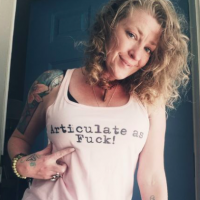What are we afraid of when it comes to giving ourselves to another—to life?
We’re afraid of rejection and abandonment; we’re afraid of love disappearing.
But we can’t lose what we are—that is real love.
If you’re like me, you might also be afraid of leaving yourself behind. Commitment has always turned into an act where I am no longer the star player of my life. My needs, desires, and creativity have paid the price in the past. I can’t do that again.
Yet, I yearn to share myself.
I long to fall into someone’s arms and lose myself. Oh, wait, I’ve done that.
Let’s be more accurate: I want to unravel in someone’s embrace, and be discovered; I want to explore our nooks and crannies and scars, together.
Scars are sexy. Whether they are the lines I trace on my lover’s skin or the harder to see, yet achingly real, wounds of the psyche. Whether they are rough and healing—or weeping from caring and daring to risk, and choosing to open—I love scars.
And we all have them.
We all have gaping crags that buttress our souls’ rivers, those sweet founts in which we hope to play, yet so often, shy away from.
Perhaps the water will be cold; perhaps there are monsters below those dark mirrors that will pull me under and once again butcher my heart, devouring its sweet flesh for their own amusement; perhaps the water is shallow, and if I dive in I will wind up with yet another concussion.
Can my brain take any more injury? Can my heart?
I’ve been broken so many times—not just by lovers; by caregivers, friends, and colleagues—by life.
I am afraid to trust.
My mind tries to paint the faces of past abusers on the sweet, sexy man standing in my doorway. He’s wearing ripped work-jeans and a rancher’s hat. He places his calloused hands on my black-lace clad body, and I melt for him, pouring passion into his heart, and all over his skin. I lick little words from his lips and let long sighs escape into his mouth.
We are a blessing by merely holding each other. Satisfying and warm, the mists of my fantasies have manifested. This is real, and it feels good.
Yet, my mind is suspicious that he is not who my whole body tells me he is. Too many men have hidden cruelty and cowardice behind well-meaning masks.
My healing practice is full. My work supports people; my words touch the hearts and minds of thousands; my care shapes my life; I am of benefit. Yet, imposter syndrome lurks—it makes me anxious.
Dear Brain,
Please stop making up stories! The tales you are trying to weave are ones we have already lived. I know you are trying to protect me. I know this hurts as much as it feels amazing, and that is confusing. I know you think if you paint enough paranoia onto the pages of my life, that will somehow save me from being hurt again.
Well, Brain, I’ve got news for you: that form of protection hurts as much as the past hurts; it leaves no room for the hope of something new, and I am doing so much more than hoping—I am healing.
Please get on board with this reality. Stop making the Boogie Man appear behind every shadow. Stop sending signals that feel like raw terror through my whole body. Stop trying to convince me that the perfectionists’ path will prevent pain. Just stop.
Love,
Justice
People who suffer from PTSD not only feel stressed when there is a threat; we feel on edge when there is no imminent danger. Our nervous systems have been so hard-wired for trauma, that the only thing that makes sense to our bodies is to keep on constant alert for the next, inevitable, awful thing.
We are always waiting for the other shoe to drop. We always imagine a scary scenario.
People tend to think of PTSD as something that soldiers come home from war with. Yes. It also happens in family systems; it happens in romantic relationships; it happens in the schoolyard and classrooms; it happens whenever, and wherever.
Trauma sticks in our nervous systems until we feel supported enough to shake it out—until we can give the story a new context, and we can safely release the energy, and often hormones, that get stuck in our tissue.
As we unravel the emotional and relational layers of PTSD, we may have a hard time trusting people. We are often afraid of being rejected or abandoned.
We have a hard time opening up. We have a hard time with intimacy. We project, deflect, run, hide, and become so skillful at maneuvering around our pain that we wind up isolating or numbing our way through life—anything to avoid our holy, human brokenness.
“There is a crack in everything. That’s how the light gets in.” ~ Leonard Cohen
My brokenness is no different than the brokenness of the world.
I sit by the Gallatin river and grieve for our polluted waters. My tears slip into her stream. My body trembles with the earth, and rumbles with an awareness of the unsustainable practices we use to extract her precious resources—to feed our greed.
I squirm and writhe with injustice.
The behaviors of the man sitting in the highest political office pokes my deepest wounds. I call him the “Violator in Chief;” his misogyny churns in my guts. His lies taste like the ashes of my childhood. The personal is political. Our wounds get paraded on the world’s stage to tend and mend.
The wounds of a world determined to escape itself are destroying us little by little, and more and more, by the day.
These violations remind us of how broken and helpless we feel. They take us back to a time when we were unable to stand up for ourselves, unable to stop the hurt, and unable to ask for what we needed. The weight of it all makes us feel small, unsafe, and unimportant.
But we are no longer children, and wounded as we all are, that doesn’t make us failures. We need to take a deep breath and remember that we matter.
Our brokenness is not our weakness; it is our strength. Our wounds do not make us unlovable; they show us where we need to look and what needs our care.
There is no difference in how we meet the pain in ourselves and how we meet the pain in the world.
If we want to know love, we must start by bravely being with what has been broken.







Read 28 comments and reply